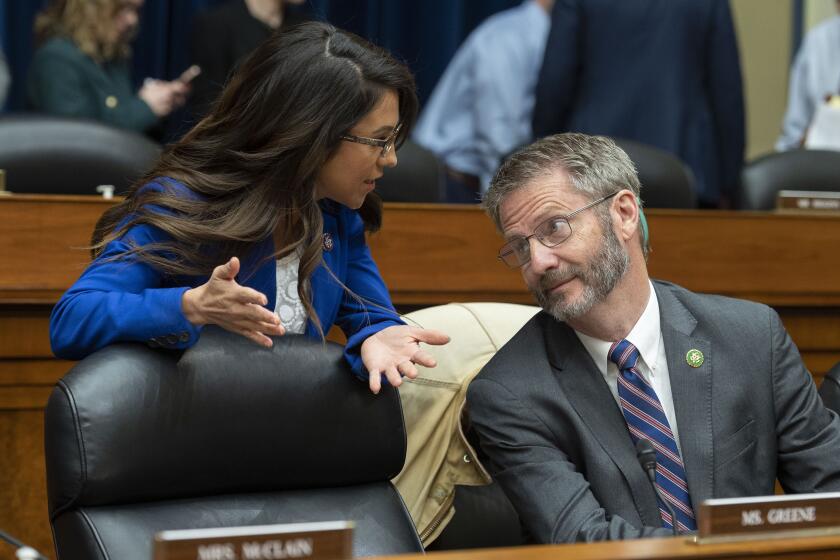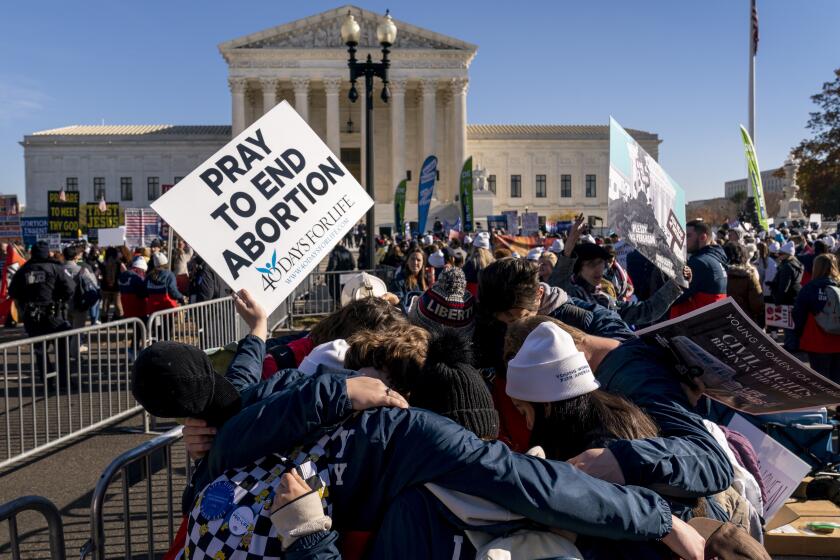Column: Republican states’ worthless post-Roe safety-net pledges

- Share via
It’s been nearly a year since the Supreme Court overturned the constitutional right to abortion and returned the issue of reproductive rights to the states. Since then, we’ve seen red states rush to ban all or nearly all abortions, some without exceptions for rape, incest or threats to a pregnant woman’s life.
What we haven’t seen is those same states doing what their “pro-life” Republican leaders promised amid their celebrations of the conservative court’s ruling: to finally deliver better healthcare and anti-poverty policies for needy women forced to give birth, and for their kids.
Opinion Columnist
Jackie Calmes
Jackie Calmes brings a critical eye to the national political scene. She has decades of experience covering the White House and Congress.
Among the most prominent promisers was Gov. Tate Reeves of Mississippi, the state that brought the winning antiabortion case, Dobbs vs. Jackson Women’s Health Organization, to the Supreme Court, and that is a perennial bottom-dweller in rankings of the states’ safety nets. Reeves proclaimed on national television networks, “We must show that being pro-life is not just about being antiabortion” and “do everything we can to make it easier on those moms who may be in unwanted pregnancies” and to ensure “that those babies, once born, have a productive life.”
Most state legislatures have held their 2023 sessions; those with antiabortion majorities have had the time and opportunity to make good on their promises to strengthen their states’ safety nets. Alas, few things were more predictable than the fact that they wouldn’t.
A similar political dynamic is at work with gun policies. After each mass shooting, Republicans say attention to mental health, not firearm restrictions, is the answer. Yet gun safety groups see little follow-through on the former. Besides, as John Feinblatt, president of Everytown for Gun Safety, says, “This is not an either/or situation — states can invest in mental health services while also passing laws to prevent people with dangerous histories from buying guns.”
When it comes to abortion bans and post-Dobbs policies, the gap between bold talk about compassion for disadvantaged women and children and action on their behalf is particularly stark.
America’s assault weapons ban, in effect from 1994 to 2004, shows that such a law enacted now would mean many fewer Nashvilles in the future.
After the Dobbs decision, Mississippi quickly banned abortion except in cases where a woman’s life is in danger or when a pregnancy results from a rape, if the rape has been reported to police. But the state — first in the nation in both overall poverty and child poverty, and second from the last in healthcare — still refuses to take the single step that would help the most low-income families: It is one of just 10 states, all of them with Republican-controlled legislatures, Republican governors or both, that hasn’t expanded Medicaid for certain uninsured low-income adults and children, even though the feds mostly pick up the tab under the 2010 Affordable Care Act.
Economists say the state is forfeiting about $1.5 billion annually to provide roughly 300,000 residents with healthcare, according to Mississippi Today. And yet, the publication reported, “There was no serious push by Republicans in the 2023 session to even debate expansion, let alone vote on it.”
And why should the legislators act? Reeves, who would have to sign any Medicaid expansion into law, remains adamantly opposed, as is the state‘s House speaker. It’s socialism, the Republicans say.
Republicans want to ban abortion but have not proposed measures to help pregnant women and their children once they are born.
The big-talking governor did relent on one policy that he and the Legislature have previously opposed: He recently signed a bill giving women who qualify for the state’s limited Medicaid coverage a full year of postpartum care, up from just two months. Healthcare, business and grassroots groups had long pressed for the extended care, and with good reason. The state’s mortality rate for women in the year following the end of a pregnancy is nearly double the national average, and deaths have long been disproportionately high among Black women.
The story is much the same in more populous Texas, the long Republican-controlled state that pioneered a dystopian bounty law to snare anyone who aided or abetted an abortion — before it and other states got the Supreme Court’s green light to ban them.
Until just days ago, Texas also long resisted providing Medicaid to women for more than two months after a pregnancy, despite increasing maternal mortality rates and the pleas of medical experts. At the end of its session, the Legislature extended postpartum care to one year. The state still refuses Obamacare’s invitation to expand Medicaid to uninsured low-wage workers generally, though one out of four women of childbearing age is uninsured — the highest share in the nation. And, like Mississippi, Texas has been embroiled in a years-long lawsuit against the shameful record of abuse in its foster care system.
Marjorie Taylor Greene leverages power with her ‘own the libs’ antics. Let’s give her what she deserves — as little attention as possible.
A headline in the Texas Tribune a year ago said it all: “Texas isn’t ready to support more parents and kids in a post-Roe world, advocates warn.” Little has changed.
Ditto in other antiabortion states, which likewise provide the least support for poor women and children. Instead of new investments in anti-poverty programs, for instance, the focus has been on promoting adoptions and effectively outlawing private funds that use contributions to defray women’s costs when they go to other states for abortions.
And, as the pro-abortion-rights Guttmacher Institute and Planned Parenthood have tracked, Republican-run states including Florida, Ohio, Missouri and Arkansas are channeling state taxpayers’ dollars to so-called crisis pregnancy centers, mostly faith-based clinics that oppose abortion and often spread misinformation about its risks. At least 10 states have diverted money from the chief federal welfare program — Temporary Assistance for Needy Families, or TANF — to grants for the antiabortion centers.
In May 2022, when the news leaked that the Supreme Court would strike down Roe vs. Wade, and Republicans were promising they’d finally apply “pro-life” activism to what happens after birth, I made a mental note to check their progress in a year — right about now.
I suspected they’d renege. Sometimes you hate to be right.
More to Read
Get the latest from Jackie Calmes
Commentary on politics and more from award-winning opinion columnist.
You may occasionally receive promotional content from the Los Angeles Times.















